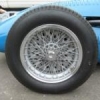Posted 29 December 2003 - 06:43
1920/21 A.I.A.C.R. Meeting
Allgemeine Automobil-Zeitung, (Wien), October 23, 1921, Nr. 43, pg. 12
Meeting of the A.I.A.C.R. On October 13, the A.I.A.C.R. held their fall conference in the building of the ACF under the chairmanship of the President, Baron de Zuylen. The Austrian Automobile Club was re-admitted as a member. The re-admission had been delayed for so long until Austria’s admittance in the League of Nations was completed. Because Hungary and Germany have not yet been admitted into the League of Nations, the clubs of both countries are at this time still not accepted in the world association of the automobile clubs.
In the foreseeable future it can hardly be expected for Germany to be admitted into the League of Nations and it appears questionable, whether this is a desirable goal for Germany even under the present conditions. The present situation in the German automobile sport is still such, that German drivers cannot participate at events of the Entente countries[occupation forces] with the exception of Italy, but German cars possibly could do so when driven by non German drivers.
During the meeting a new executive committee was elected with representatives from France, Great Britain, Belgium, Spain, United States, Switzerland and Czechoslovakia.
The A.I.A.C.R. was founded at a time when the first large, leading automobile clubs of the various countries became active and organized international races, which was in the first years after the turn of the century. They dealt with the introduction of uniform rules for the different racing categories and later always new questions required a uniform solution. Therefore a discussion and an agreement in so many important matters were necessary. From these attempts emerged the foundation of the Association of International Recognized Automobile Clubs, which comprised the leading automobile clubs of the different countries and which as a rule, met twice yearly in Paris, namely in June just before the major race of the season and in December on the occasion of the Paris Salon.
Up to the time before the outbreak of the Great War, the leading clubs of the following countries belonged to the A.I.A.C.R.: France, Germany, America, Austria, Belgium, Denmark, Egypt, Spain, England, Holland, Hungary, Italy, Japan, Norway, Portugal, Romania, Russia, Sweden and Switzerland. The last meeting of the association to which representatives of Germany and Austria were sent to Paris, took place on the occasion of the Salon in 1913 on October 23.
In June 1920, a meeting of the association took place where Baron de Zuylen presided. The Vice Presidents at that time were General Sir Holden (England) and Marquis Ferrero di Ventimiglia (Italy). The automobile clubs of China, Finland, Poland and Czechoslovakia were admitted into the association.




















